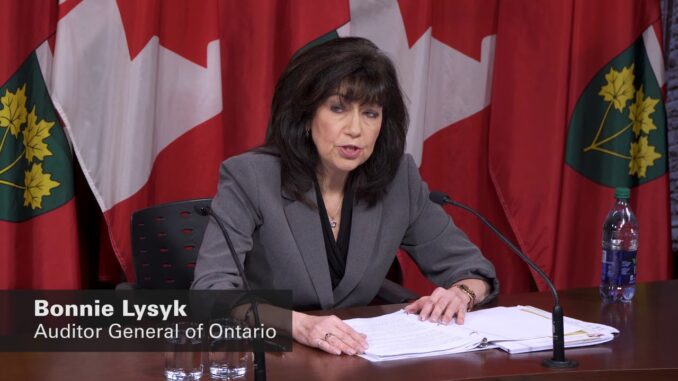
– Sabah Ahmed, Toronto –
The annual report of Auditor General Bonnie Lysyk on December 1 shows that the majority of Ontario businesses that did not qualify for pandemic support were given more than $200 million in aid. A few of the businesses got more money than their financial losses. On the other hand, businesses that struggled to keep running during the lockdowns did not receive any COVID-19 relief.
The report examines 18 topics of questionable government spending of which pandemic support for businesses is one.
The Auditor-General report also investigates police staffing shortages in Ontario due to a high number of medical leaves, incompetent age verification methods by the Cannabis retails in Ontario, waiting for periods for outpatient surgical treatments, and ministerial zoning orders to speed up development projects in the province.
Ontario received $11.2 billion as pandemic relief for businesses from the federal government, nearly one-third of the total COVID-19 relief for the province. The Auditor found poor allocation of resources, unclear goals, and lack of consultation with the most hard-hit businesses, which led to ineligible businesses getting the biggest share.
Lysyk said, “Given the amount of money, the absence of better controls or assessment processes is troubling. Even in a crisis, systems should be in place to make sure that only eligible businesses receive taxpayer dollars, and program funds reach those who need it most.”
Another pandemic support program that did not carefully assess the eligibility of the applicants is Ontario Small Business Support Grant, leading to a grant of $210 million around 15, 000 non-qualifying recipients. Right now, the province has no plans to recover this amount, while it is being determined whether additional grants of $6 million were made to eligible recipients or not.
The report findings show that 50% of the businesses that were supported through pandemic relief funds, got a higher amount than the losses they incurred. The businesses received around $714 million more than what they collectively lost.
The report states that the recipients of COVID-19 relief funds were businesses that were still managing to cover their costs and not intended for the program.
When questioned about the distribution of funds to less deserving businesses, Premier Doug Ford said:
“When we’re rushing the money out the door to support the small businesses that were in desperate need of it, unfortunately, you’re going to see some fraud.”
He added, “We’re going to always continue looking into it, seeing where we can improve, but there’s a lot of people that were supported to a tune of $3.3 billion … I think more people benefited than got hurt.”
Reporters asked Premier Doug Ford several times this morning about the auditor general’s findings on the Ontario COVID-19 Small Business Support Grant. Here’s his response to one of the questions. #onpoli pic.twitter.com/sPmiJTCKac
— Mike Crawley (@CBCQueensPark) December 1, 2021
The provincial government has also paid more than $15 million in energy and property tax rebates to businesses that did not qualify for the program. The report has also highlighted discrepancies in Ontario’s Together Fund, which provided financial aid to businesses during the pandemic to adjust their operations during the pandemic.
The Together Fund aided a business $1.8 million, later seeing it file bankruptcy within eight months. Two instances of conflicts of interest were noted in the audit, one where the Economic Development Ministry granted $2.5 million to a company’s CEO who also was a member of the COVID-19 Vaccine Task Force.
Lysyk stated, “It’s not acceptable. There should have been a declaration of a conflict of interest.”




Be the first to comment